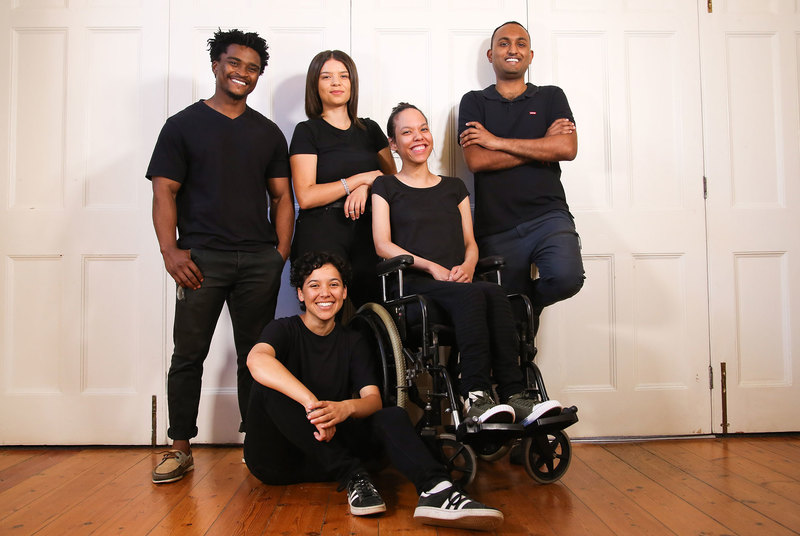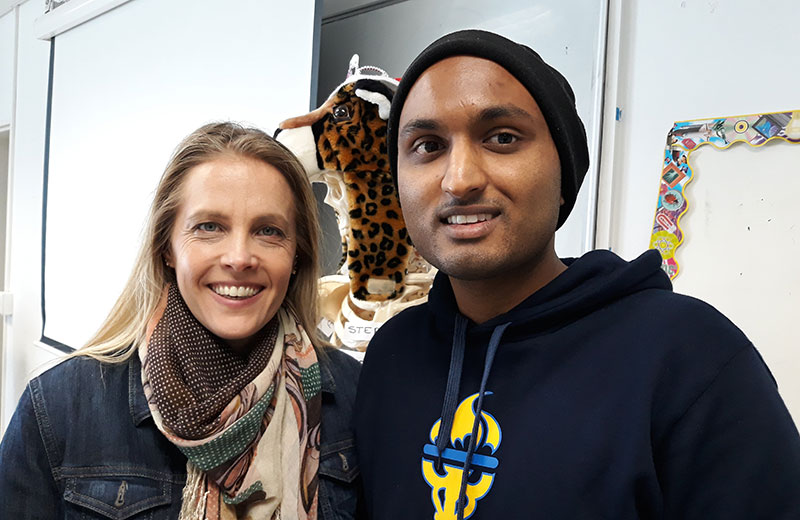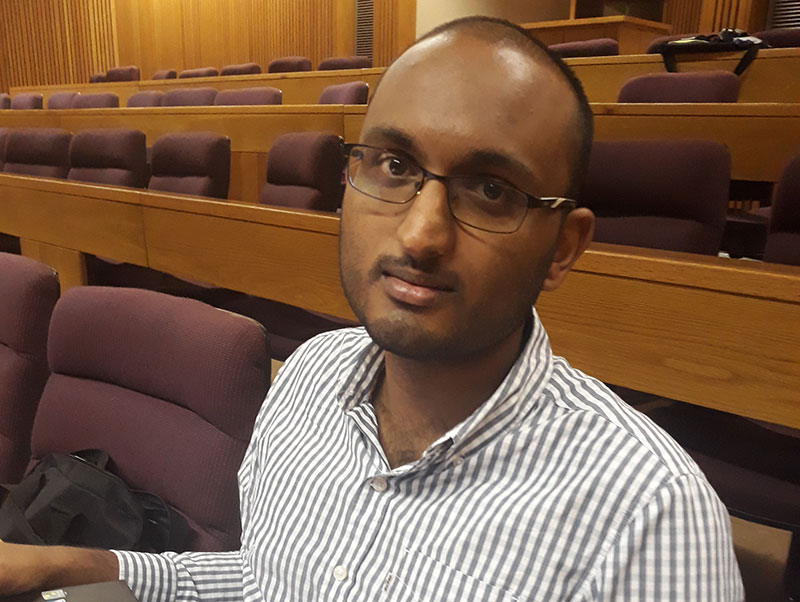Trials, tribulations – but a degree 10 years later
26 March 2020 | Story Carla Bernardo. Read time >10 min.
It doesn’t matter how long it takes to get your degree, it’s that you get it in the end. This couldn't be truer for Paveshan Moodley who, after 10 years, graduates from the University of Cape Town (UCT) with a BBusSc Finance with Accounting.
Paveshan’s journey at UCT has not been an easy one. Over the past decade, he has faced down the odds. He has battled financial issues, the pressure to assimilate and mental health issues, to name a few of his challenges. But he has prevailed and walks away not only with a degree but also secure in the knowledge that he is now well equipped for the road ahead.
Paveshan grew up on Umbelibeli Farm near the small rural town of Umzinto in KwaZulu-Natal (KZN). His family has a long history in the area: His paternal grandparents settled there early in their lives, having arrived as indentured labourers. They, along with Paveshan’s father, worked the land and the surrounding sugarcane fields.

As a child, he spent most of his time indoors because of his chronic asthma and a weak immune system. He often found it lonely because there were no other children on the farm other than his siblings, who were a lot older, and cousins who he didn’t see very often.
His childhood was tough in other ways too. The family struggled financially and at one stage lost everything they owned in a house fire. Fortunately, the farm’s community pooled their resources and helped the Moodleys restart their lives.
“If I messed up my education, I would not be able to do much else in life.”
In 1998 Paveshan began primary school in Scottburgh and continued high school in the area. He was a top academic performer throughout his years at school and finished matric in 2009 as one of the province’s top achievers.
“If I messed up my education, I would not be able to do much else in life,” he said. “So, I took school very seriously … so that I could study what I wanted to, earn well and not struggle.”
Despite performing well academically, he had difficulties with the phonetics of languages. He also struggled with remembering content from his classes but, because of his good academic results, no one bothered about this too much. He was also afraid of drawing attention to it for fear of being stigmatised.
It was only when he started studying at UCT that his learning challenges became apparent.
Unsettled, ill-equipped
Adjusting to university and life in Cape Town took a lot out of him. He couldn’t believe how frequently people would buy takeaways – a luxury he and his family could not afford in KZN. There were chain stores he had never heard of, he was uncomfortable in his hand-me-downs, he felt immense pressure to assimilate and struggled to make friends in the beginning.
“It was a big change. Everything was unsettling,” he said.
Even choosing his academic programme was problematic. He initially enrolled to study actuarial science, but after his first week of Mathematics MAM1000W, he ended up changing his degree at least three times in the first few weeks.
“I really was going to die that night and I have never seen my mother cry so much.”
As well as feeling ill-equipped for campus life, he struggled with the heavy workload and often found the curriculum “colonial” and alienating. “It marginalises who can access education not based on ability and hard work but whether one came to university with private education, took more subjects, and, during university, has the ability to continue to access resources.”
He also encountered racism and classism from a few members of the campus community. He remembers being mocked about his clothes and having a fellow student comment that he was from “the farm”, a derogatory term used in the Indian community for darker-skinned descendants of slaves or indentured labourers.
There were some good moments in between it all though, including experiencing Cape Town and UCT’s diversity, watching live cricket matches, making friends and learning about people living with disabilities. Unfortunately, his difficulties settling in led to the resurgence of an earlier anxiety disorder.
Leave of absence
When Paveshan was 12, he suffered his first panic attack. His parents rushed him to the hospital with a loss of oxygen to all but his vital organs.
“I really was going to die that night and I have never seen my mother cry so much.”
After that, he had seemed to be able to keep it all at bay, but at UCT his struggles with mental health became apparent. His anxiety would often flare up, he would have to defer exams, contend with potential academic exclusion and fail and repeat courses.
In 2015, while in his sixth year of studies, Paveshan was forced to take his first leave of absence (LOA) as he was suffering from generalised anxiety disorder and major depression. He admitted himself into Valkenberg Hospital’s inpatient programme.
He couldn’t escape the stigma surrounding mental health in the Indian community and after a while, he left. Two years later, he took another LOA and made his third trip to a psychiatric ward.
“I think these challenges have also been some of my defining moments,” he said.
Support network
A lot of what it took to get his degree came from drawing on his own resources and from his certainty that education could be a way out of poverty. He worked odd jobs, often juggling several at once, took on internships and secured scholarships.
In addition, he had the strong support of his parents. They did whatever they could – from taking out loans to dipping into savings or working extra jobs. They also spent many hours on the telephone to him and were patient throughout. His sister was also “a rock”, assisting their parents with his accommodation costs.
The Faculty of Commerce’s Education Development Unit (EDU) was key in Paveshan reaching the undergraduate finish line. He joined the EDU in 2010 and they have been his “family away from home” ever since.

“They facilitated classes, provided emotional support and dealt with copious amounts of admin, without which I would not have made it,” said Paveshan.
He added that no one should shy away from the EDU or similar programmes at UCT. “Please do not feel bad or look down on the people who do join these departments. Sometimes you need an academic or organisation to fight your case and stand by you.”
Paveshan is also grateful for the support and empowerment he received from and through UCT’s Student Wellness Service, faculty psychologists, his psychiatrist, the Office for Inclusivity & Change and the university’s Disability Service. He strongly advises students to make use of these services and to do so as early as possible.
Journey ahead
While Paveshan is saddened by the suspension of the March graduation due to the outbreak of COVID-19, he understands the circumstances surrounding it.
“Graduation is more than a rite of passage. After 10 years of strife, it says, ‘I see you, I hear you. You are acknowledged’, ” he said.
While he waits for circumstances to improve, he is continuing to upskill himself. During his first LOA, he enrolled with the University of South Africa for a BSc in Mathematics and Mathematical Statistics, using credits from UCT courses that would not count towards his BBusSci. He is also studying online through CA Connect to obtain his postgraduate diploma or a certificate of theory in accounting and intends to take up software studies.
Paveshan has been identified as one of 10 000 young Africans who are tipped to be the continent’s next generation of technology leaders. This includes a scholarship from the Egyptian government and studying through a United States research-intensive public institution.
“The world, and Africa especially, needs more young people to stand up and lead with courage, compassion and ethics,” he said.
Reflecting on his decade at UCT, as the first in his family to attend the university and as someone who has battled many odds to make it, Paveshan has a final piece of advice for his fellow students.
“Inevitably, you have to plan to get through and adapt. This is the definition of being smart, which we all are by virtue of having beaten the odds to make it to UCT.”
 This work is licensed under a Creative Commons Attribution-NoDerivatives 4.0 International License.
This work is licensed under a Creative Commons Attribution-NoDerivatives 4.0 International License.
Please view the republishing articles page for more information.
Graduation March 2020
We understand the disappointment that our students and their families feel about the suspension of the March 2020 graduation ceremonies. Please know that the decision to suspend the ceremonies was not taken lightly. We congratulate the March 2020 qualifiers on their academic success. All graduands will graduate in absentia, with a confer date of 19 March 2020. Graduation certificates will be issued to qualifiers and the Registrar has communicated directly with all qualifiers about the arrangements for the issue of graduation certificates and transcripts.
Find full information, including Frequently Asked Questions, on the Graduation page on the Students website.
Our stories: inspirational graduates
Although UCT has suspended the March graduation season because of concerns about the spread of Covid-19, the news team would nonetheless like to honour those who would have been capped. We have chosen to profile a cross-section of inspirational graduands whose stories we’d like to share. To all those we haven’t been able to feature, we’d like to say: each one of you is an inspiration – to your university, your families and your communities. Stay healthy.





















